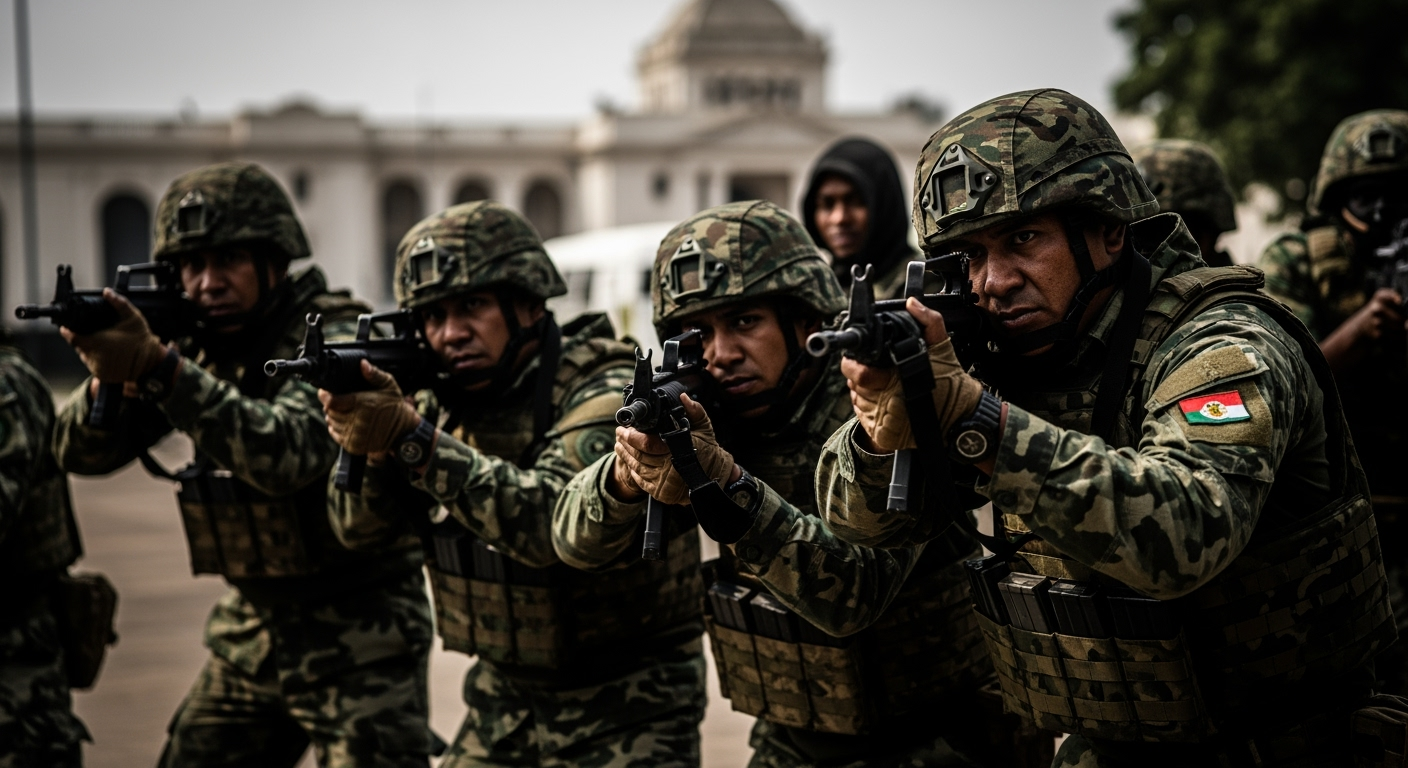Related Articles

Poland's Enduring Economic Ascent: A Central European Success Story

Sara Däbritz Announces Retirement from German National Team After Illustrious Career





ANTANANARIVO, Madagascar – Madagascar has been thrust into a profound political crisis following the dramatic declaration by an elite army unit, the Army Personnel and Services Administration Corps (CAPSAT), that it has assumed control of the nation's military. The move on Sunday, October 12, 2025, came just a day after CAPSAT soldiers openly sided with a surging wave of anti-government "Gen Z" protests in the capital, Antananarivo, escalating weeks of civil unrest into a full-blown confrontation with President Andry Rajoelina's administration. Rajoelina’s office promptly condemned the actions as an "attempt to seize power illegally and by force," signaling a perilous moment for the Indian Ocean island nation with a long history of political turbulence.
Military Defiance and Claims of Control
The pivotal shift occurred on Saturday, October 11, when soldiers from CAPSAT, based in the Soanierana district, left their barracks and joined thousands of protesters converging on the symbolic Place du 13 Mai in Antananarivo. Videos shared on social media showed CAPSAT soldiers urging their comrades to "support the people" and "refuse orders to shoot" at demonstrators. This public display of military defection marked a critical turning point for the youth-led movement that has been challenging the government since late September.
On Sunday, CAPSAT solidified its stance with a public statement asserting command over the entire Malagasy military. "From now on, all orders of the Malagasy army — whether land, air, or military — will come from the headquarters of CAPSAT," officers declared in a video message. Further cementing their challenge to presidential authority, the unit proceeded to install General Demosthene Pikulas as the new Chief of the Army Staff during a ceremony attended by Armed Forces Minister Manantsoa Deramasinjaka Rakotoarivelo. The minister reportedly gave his "blessing" to Pikulas's appointment. This sudden shift in military allegiance immediately raised fears of an attempted coup, a grim possibility in a country where the military has historically played a decisive role in political transitions.
Roots of the Unrest: From Utility Shortages to Calls for Resignation
The current crisis did not emerge in a vacuum but is the culmination of weeks of escalating frustration across Madagascar. Beginning on September 25, 2025, widespread youth-led protests, organized by a group calling itself "Gen Z Madagascar," initially targeted chronic power outages, water shortages, and rising living costs. However, these grievances rapidly morphed into broader demands for profound political change, including the resignation of President Rajoelina, an end to alleged corruption, and a comprehensive overhaul of the political system.
The government's initial attempts to de-escalate the situation proved insufficient. On September 29, Rajoelina dissolved his government. A week later, on October 6, he appointed military general Ruphin Fortunat Zafisambo as the new Prime Minister, a move seen by some as an attempt to shore up military support. Yet, these concessions failed to appease the protesters, who rejected calls for dialogue, deeming them "a mockery" and insisting on the president's departure. The United Nations reported at least 22 fatalities and over 100 injuries since the protests began, figures disputed by President Rajoelina, who claimed only 12 deaths, asserting those killed were "looters and vandals."
A President's Precarious Position and Regional Concern
As the crisis deepened, President Rajoelina's whereabouts became a subject of intense speculation on Monday, October 13. Despite official statements from his office assuring the public that he remained "in the country" and "continues to manage national affairs," conflicting reports, including one from French broadcaster RFI, suggested he might have been evacuated. Public Security Minister Mandimbin'ny Aina Randriambelo stated that even he was unaware of the president's precise location.
The precarious situation has drawn urgent attention from international bodies. On Monday, the African Union (AU) Peace and Security Council convened an emergency session to address the escalating tensions. The AU Commission Chairperson, Mahmoud Youssouf, expressed "deep concern" and called on all Malagasy stakeholders, both civilian and military, to "exercise calm and restraint" and prioritize peaceful, constitutional solutions. The U.S. Embassy in Antananarivo issued an advisory, urging American citizens to shelter in place due to the "highly volatile and unpredictable" situation.
Historical Echoes and Uncertain Future
Madagascar, an island nation of over 30 million people, has been plagued by recurrent political instability since gaining independence from France in 1960. President Rajoelina himself first ascended to power in a military-backed coup in 2009, an event in which CAPSAT played a significant role by backing his rise from mayor of Antananarivo to transitional leader. He was subsequently elected president in 2018 and re-elected in 2023, though the most recent election was marred by opposition boycotts and allegations of irregularities.
The current defection of CAPSAT soldiers, a unit that once supported Rajoelina's ascent, underscores the fragile nature of Madagascar's civilian-military relations and the deep-seated structural fragilities within its political order. While CAPSAT leadership, through Colonel Michael Randrianirina, has denied orchestrating a coup, stating the army merely "responded to the people's calls," the installation of a new army chief by a renegade unit indicates a clear challenge to the established chain of command. This unfolding drama represents one of the most serious political ruptures in Madagascar since the 2009 power transfer, and its resolution will profoundly shape the country's trajectory for years to come. The coming days are expected to be critical as the nation watches for a potential confrontation or a negotiated path forward.